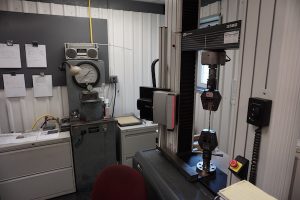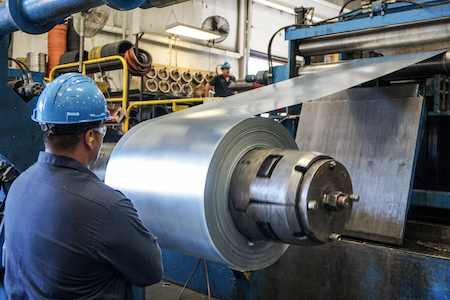In Hascall Steel’s testing laboratory we run a battery of tests that capture intrinsic properties of our steel. Some of these tests uncover the mechanical properties of the steel. This helps Hascall determine which material needs to be used to meet the customer’s exact specifications. Having our own testing facility on-site is extremely beneficial for our customers because we are able to expedite the steel selection process from a matter of days, down to minutes.
Rockwell Testing
Many of our customers come to us asking for a selection of steel with a specific range of hardness or a minimum hardness level. The measurement tool used to determine hardness level is known as Rockwell Machine. The ranges in Rockwell are dependent on the gauge of material being tested. The most common scale in the Rockwell test arena is the B Scale (B-scale conversion), and is normally found in gauges .040 and above. For gauges under .040 there are two different scales used to determine hardness (T and F). All of the scales can be converted to the standard B-scale which is the most common expression of Rockwell.
With the standard B-scale, softer steels, in commercial quality will range from a 40-60 Rockwell reading. A mid to high range would be a Rockwell of 60-80, and over 80 would be extremely hard. Within Hascall’s laboratory are state-of-the-art Rockwell machines from Medatoyo. These digital machines are able to convert between the B-scale, T-scale, and superficials on the low side. All purchased steel is tested within the Medatoyo system and the findings are entered into Hascall’s database for accuracy and efficiency.
Tensile, Yield, and Elongation
Hascall Steel also has a state-of-the-art machine TYE machine making use of an Advanced Video
Extensometer (AVE). Rather than a mechanical attachment to the test piece, it’s a video camera that measures through the electronic eye the distance and elongation point of a steel t est piece. So what are the
est piece. So what are the
things that are measured with an AVE? The three main components measured are tensile, yield, and elongation. Our equipment also records the R and N value of every sample tested.
Tensile
What tensile is measuring when testing a sample of steel is its holding strength. The tensile point is found when the steel finds its failing point or breaking point. Common tensile ratings generally range from 45,000 to 80,000 psi (pounds per square inch).
Yield
The yield point is the point of testing where the steel begins to fail. Placing more weight or stress on the steel greater than its known tensile will find the yield point. The yield point will always be lower than the tensile.
Elongation
Elongation is the distance between the yield point and tensile point, or from the start of failure to actual breaking point. Elongation measurements are always displayed as a percentage point. The percentage comes from the starting point of two inches on your sample size that is then stretched. So if the steel was stretched from the known standard of two inches to a final three inches before breaking, the elongation would be recorded as 50%. Common elongations observed are typically between 20% – 50%.
R & N Value
R value is a measure of steel’s drawability. N value is a measure of steel’s workability, or strain hardening.
How this test is actually performed is the laboratory technician will place a known dimensional sample into the jaws of the TYE machine. The jaws begin to apply pressure to the steel sample in order to find the tensile and yield points. All the while the Video Extensometer is recording the stretch and break points. This test is essential is trying to find how much weight the steel can hold under pressure. All three measurements work in combination with each other, but it’s the yield that the customer is normally most interested in.
When it comes to steel testing, ensuring accuracy is Hascall’s number one priority. Having a wide range of available steel with known mechanical properties helps us to be able to supply the exact specification of steel needed for a client. When we discuss the surface hardness measurement and tensile, yield, and elongation; we are really speaking to the potential ductility or moldability of the flat-rolled steels. These are considered to be the mechanical properties of steel which are derived from the chemical properties of steel. The mechanical properties of steel determine strength, ductility, and weldability that steel manufacturers most often need to ensure the proper construction of the final product.

